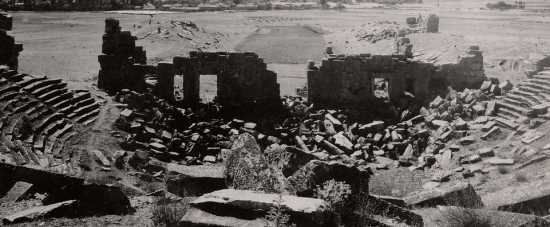Myth of Azan
Azan, the founder in Aizanoi Ancient City, is the son of Erato, a water nymph, and Arkas, the king of the Arkadya region in Greece. He established Aizanoi next to the water. The water holds a legendary importance in Aizanoi. Azan, the son of a water nymph, founded Aizanoi, and perhaps just because of this he chose the water’s edge.

Location of Aizanoi
Aizanoi is in the Çavdarhisar district, which is approximately 50 km from Kütahya province. The first settlement in the Ancient City of Aizanoi was established on the upper part of the Kocaçay River, go back to 3000s. The first systematic excavations in the Aizanoi Ancient City, so far 10% are currently unearthed, were initiated by the Germans in 1926.
History of Aizanoi
Aizanoi, the city of the Aizanilist People, respectively lived under the Phrygians, under the Roman Empire, under the rule of the Kingdom of Pergamon, the Kingdom of Bithynia, the Roman Empire, the Eastern Roman Empire, the Seljuks, and the Ottoman Empire. It is estimated that the population increased to 120000s in the second century before Christ. The ancient city of Aizanoi is contemporary with cities such as Ephesus, Bergama, and Side.
Among the ruins that can be seen in the city, which is located at a height of 1000 meters above sea level, Temple of Zeus, Theater and Stadium Complex, Baths-Palaestra (Physical Activity Area) Complex, Colonnaded Street, Stock Exchange Building, Arched Stone Bridges, Waterways, Necropolis (Grave Area) can be counted.
Places to See in Aizanoi Ancient City
Macellum (Stock Exchange Building)
Macellum, which is dated to the second century after Christ, was used as a market complex, where products like food were sold. It was open every day of the week. Inscriptions showing the ceiling prices and labor costs of the goods on the walls of Macellum, which is considered as one of the first ancient trade exchanges in the world. These inscriptions are proofs of the ‘’Ceiling Price Application’’ of the Roman Empire.
Ancient Bridges
Although 5 bridges were built on the Kocaçay River, which was called Pankalas in the Ancient Period, only 2 are standing today due to earthquakes.
Colonnaded Street
Colonnaded Street, known as the main street of Aizanoi Ancient City, goes up to the Temple of Zeus. 450 meters of this four-kilometer road is lined with columns and the rest is in the form of a walking path. The Roman Soldiers saluted the people on this path with their spoils upon the return of the war.
Temple of Zeus
The temple, which started to be built in the first century after Christ, was completed in the second century after Christ. It is one of the rare examples in the world where a temple built in the name of God Zeus is this much well-preserved. Columns of the Zeus Temple in Aizanoi are in the 8 × 15 Ionic order and each one is single standing.
Roman Baths
One of the baths in the city is between the Temple of Zeus and the Theater. There are bathing pools in the middle of the large-scale building dating back to the second century AD. The rich marble coverings of the building and the remains of water heating channels can be seen. Another bathhouse stands out with its mosaic works.
Ancient Theater and Stadion
The Theater and Stadium, which are connected by two main gates, are a unique complex since they are both side by side and on the same axis. Aizanoi stadium has a capacity of 13500 people and its theater has a capacity of 20000 people. The stadium used for gladiator fights and the Olympics was carved into a hill as commonly seen in Greek architecture. Both structures are partially standing, even though they were hit by several earthquakes.
Tour Guide to Aizanoi Ancient City
Aizanoi Ancient City is open every day of the week. The entrance fee of Aizanoi is 10 Turkish Lira. Magnesia ad Maeandrum can be visited from 08:45 to 17:39 in winter and 08:45 to 19:00 in summer. You can always contact me to learn more about Aizanoi Ancient City and write to me if you need to book a tour guide to Aizanoi Ancient City in Kütahya, Turkey. See you soon, Hasan Gülday.